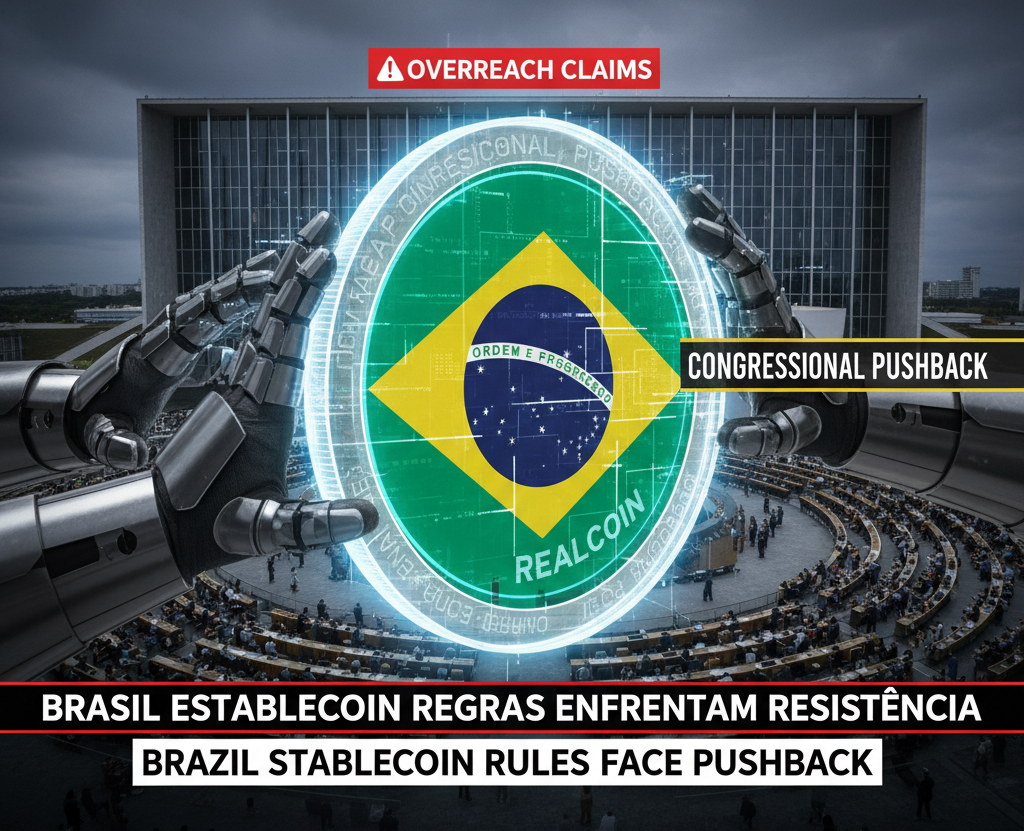The introduction of Brazil stablecoin regulations has led to a political conflict that seems to be short-tempered as a new draft version of the legislation accused Central Bank of exceeding its legal power. The proposal is a protest against the most recent regulatory action on the part of the institution and it threatens dire outcomes on the side of users and the companies.
Brazil Stablecoin Rules and Central Bank Authority are drafted in Congress.
The uproar began when Representative Rodrigo Valadares proposed a draft that was aimed at the new Brazil stablecoin regulations. He claimed that the bank was going outside its mandate by treating the operation of stablecoins as foreign-currency operations. However, this shift might shift the way citizens and companies utilize digital assets in the country.
On November 10, the Central Bank of Brazil revised its crypto framework. It tried to address the stablecoin operations in the foreign exchange and capital market regulations. Consequently, the process of purchasing, selling or trading of the stablecoins would be in accordance with the standards of the currency transactions. This action would occur in the next February.
Nonetheless, these rules of Brazil stablecoins caused an alarm in the industry. The change was discouraged by many market players who said that it would slow down the adoption. They were afraid that it would increase compliance expenses and restrict access to stable digital tools that can be used to make payments and save money. Other analysts also observed the move would remake the fast-expanding Brazilian crypto economy.
New Political Pressure Tests Brazil Stablecoin Regulations and their Economic impact.
Valadares claimed that the Brazil cattlecoin regulations establish indirect taxes. He said that the tax burden of users was about $ 2 billion when these transactions are classified as foreign-currency operations. To him this is a breach of law and is very detrimental to competitiveness. He said too that these rules might make it hard to invest in a market that is structurally challenged.
The bill requesting Congress to suspend Central Bank Resolutions 519, 520 and 521 is the draft law. These resolutions determine how digital representations of value that are associated with foreign currency are treated under the regulation. They also categorize flows of stablecoins in the foreign exchange market. According to Valadares, this reclassification gives the bank the powers, which it does not have.
Moreover, legislators observe that the Constitution vests in Congress the obligation to levy taxes and as well as to design economic policy. Consequently, they state that the central bank is not able to develop the rules that lead to the emergence of the new taxable events. A large group of legal scholars also mentioned that any expansion of regulations should be preceded by the approval of legislature.
Experts Warn Brazil’s Stablecoin Rules Risk Innovation
The industry members are still on the alert even though Central Bank justified itself. They claimed that clarity is required to leave the digital asset environment in Brazil open and competitive. A number of experts elaborated that regulation ought to change. However, it should not jeopardize innovation, adoption or investment. The Brazil stablecoin regulations, they claimed, ought to be strengthened before being implemented.
These measures might be revisited by the Congress in case Valadares draft is adopted. This would require the bank to make changes to the Brazil stablecoin regulations without increasing its jurisdiction. It may also have to seek the advice of the lawmakers prior to issuing new directions. This process may slow down the framework that was scheduled in February.
Nevertheless, in case the rules become effective, they might alter the Brazilian crypto usage. They can restrict access to stablecoins and cause their prices to increase. Many worry that the country might fall behind in the world of global digital finance as the adoption of digital finance increases.
